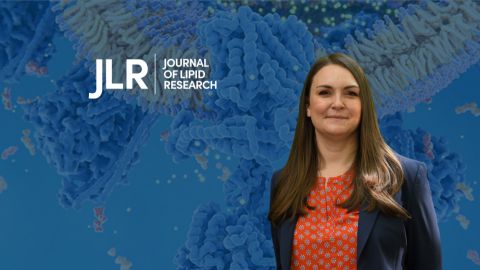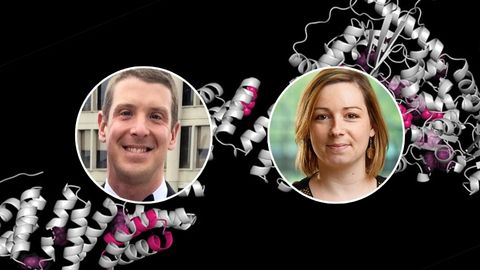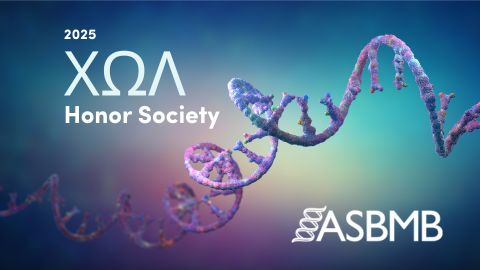Dagar dissects a prostate cancer driver
Many cancer treatments block hormones that drive tumor cell division and metastasis. These therapies only shrink tumors temporarily, however, as cancer cells can use alternative signaling pathways to reduce their hormone dependence. Drugs that target these pathways may halt tumor growth and extend patient survival.
The 2020 JBC Herbert Tabor Early Career Investigator Award winners will present their work at the 2021 ASBMB Annual Meeting, 1:45–3 p.m., Tuesday, April 27.
Find out about registering for the annual meeting here.
Manisha Dagar has uncovered the details of a signaling pathway that drives advanced prostate cancer.

Dagar has always been interested in science, especially biology. Her mother encouraged her to pursue higher education and a research career. She earned an undergraduate degree in biotechnology, and a summer internship at the National Centre for Disease Control in New Delhi gave her the lab experience she needed to pursue a Ph.D. at Amity Institute of Biotechnology, Amity University in Haryana, India.
At Amity University, Dagar decided to study the molecular biology of cancer. She joined Gargi Bagchi’s lab, where she studies androgens, the male sex hormones, in prostate cancer. Previous research revealed that protein kinase A, which phosphorylates proteins to change their functions, can activate androgen signaling in the absence of hormones. Dagar and colleagues in the lab discovered how this aberrant activity contributes to prostate cancer progression.
Dagar studied protein kinase A function in a cell line derived from a prostate cancer patient. After optimizing protocols to measure protein levels in these cells, Dagar could track how blocking protein kinase A phosphorylation activity changed androgen signaling. Her work has revealed new drug targets that could treat advanced prostate cancer.
Dagar successfully defended her Ph.D. thesis in January. She hopes to pursue postdoctoral research studying cell signaling. Outside the lab, she enjoys reading and traveling.
Targeting molecular chaperones to stop prostate cancer
Testosterone and related androgen hormones act through the androgen receptor, which is stabilized in the cytoplasm by the molecular chaperone HSP90. When the receptor binds an androgen, it releases HSP90 and enters the nucleus to regulate gene expression. Androgens thus direct the development and maintenance of the prostate gland but also drive prostate cancer.
Manisha Dagar and her colleagues knocked down protein kinase A to learn how this enzyme affects androgen receptor nuclear entry. They discovered that protein kinase A phosphorylates HSP90, causing it to release the androgen receptor. The receptor then binds HSP27, a different molecular chaperone, which helps it enter the nucleus. Once in the nucleus, the receptor can bind certain DNA regions to turn on genes.
Blocking protein kinase A activity blocked testosterone-induced HSP90 phosphorylation, androgen receptor-HSP90 dissociation, androgen receptor-HSP27 binding, androgen receptor nuclear entry, changes in gene expression and increase in proliferation of prostate cancer cells.
“By targeting HSP90 phosphorylation by protein kinase A, androgen signaling in prostate cancer cells can be blocked,” Dagar said. “This can be used as a therapeutic target for treatment of prostate cancer.”
As first author on the paper reporting this research, Dagar received a 2020 Journal of Biological Chemistry/Herbert Tabor Early Career Investigator Award.
Dagar and her colleagues continue to search for ways to block prostate cancer cell proliferation, including in patients that express hormone-independent variants of the androgen receptor.
Enjoy reading ASBMB Today?
Become a member to receive the print edition four times a year and the digital edition monthly.
Learn moreGet the latest from ASBMB Today
Enter your email address, and we’ll send you a weekly email with recent articles, interviews and more.
Latest in People
People highlights or most popular articles

Meet Shannon Reilly
The JLR junior associate editor discusses the role of adipocytes in obesity at Weill Cornell Medical School.

Meet Donita Brady
Donita Brady is an associate professor of cancer biology and an associate editor of the Journal of Biological Chemistry, who studies metalloallostery in cancer.

Glyco get-together exploring health and disease
Meet the co-chairs of the 2025 ASBMB meeting on O-GlcNAcylation to be held July 10–13, 2025, in Durham, North Carolina. Learn about the latest in the field and meet families affected by diseases associated with this pathway.

ASBMB recognizes 2025 outstanding student chapter
The Purdue group, led by Orla Hart, developed STEM outreach initiatives for low-income and minority students in Lafayette, Indiana.

ASBMB inducts 2025 honor society members
Chi Omega Lambda, which recognizes exceptional juniors and seniors pursuing degrees in the molecular life sciences, has 16 new inductees in 2025.

2025 voter guide
Learn about the candidates running for ASBMB President, Secretary, Councilor, Nominating Committee and Publications Committee.

